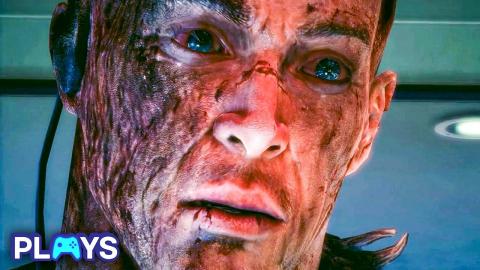The Most Evil Hero In Video Game History

The Most Evil Hero In Video Game History
Video Game Bad Guys Better Than the Hero
What’s the difference between a hero and a monster? In most video games, surprisingly little. The character the player controls often participates in an incredible amount of killing, and with seemingly no consequences to their mental state. Do those guards deserve a knife in the back? Do those treasure hunters deserve to be blown to pieces? In “Spec Ops: The Line”, the developers set out to explore how thin the line between heroes and monsters was, through the character of Captain Martin Walker. Be warned; spoilers ahead! Walker is the playable character of “Spec Ops” and is both the game’s protagonist and villain. An elite member of the United States Army’s Delta Force, Walker appears at first glance to be your typical badass soldier, a hero through and through. He’s even voiced by the legendary Nolan North, who is no stranger to playing heroic video game protagonists. All of this is intentional, to put you in the mindset that Walker is a generic action hero; he’s here to shoot the bad guys and save the day. What’s more, the hero has a background with the main antagonist of the game: Colonel John Konrad. The two have a relationship from their time in Afghanistan, when Konrad saved Walker’s life in a fight in Kabul. This gives Walker a reason to go beyond his simple reconnaissance mission when he gets to Dubai. While at first it appears that Konrad is in trouble, it quickly becomes clearer that he has actually become a monster, and it’s up to our hero to stick around and see what has become of the person they once looked up to. Interestingly, Konrad’s name is itself a reference to the author of the novel Heart of Darkness, Joseph Conrad. Heart of Darkness is a grim tale about imperialism and racism, and how the imperialists are no better than the ones they rule over. Konrad established a military government in Dubai, apparently to help the citizens evacuate ahead of the sandstorms, but with grave consequences. Upon reaching Dubai, Walker realizes the situation is far more complex than anyone could have thought. The 33rd Infantry Battalion, led by Konrad, are rounding up refugees. Walker’s squad gets into a fight with the locals as well as with the 33rd, who believe they are with the CIA. At this point in the story, Walker’s reconnaissance mission is complete. The responsible thing would be to exit the situation and report back to his superiors. Except that’s not what Walker does; why would he? He’s the video game hero! He has to act to save innocent lives. That is what every player would expect. And so Walker goes in, guns blazing, and all he ends up achieving is more death and destruction than there was before. It starts with easy justifications, but gets more indefensible as the story progresses. When Walker unwittingly launches white phosphorus on a large group of innocent refugees, he blames Konrad. When he assists in the destruction of the city’s water supply, he blames the CIA. Walker’s stated goal is to save lives, but throughout the length of the game he racks up quite the death count. His physical and mental state degrade throughout; Walker’s body gets bloodier as the game progresses, and even his attitude gets more aggressive as he executes wounded enemies with vicious hate. Of course, all of this is justified, in Walker’s mind, by the knowledge that Konrad is making him do this. Konrad forced his hand with the white phosphorus, just as Konrad forces Walker to choose between executing an Emirati or an American soldier, who both committed serious crimes. What a shock to Walker, then, when he realizes at the end that Konrad has been dead the whole time. The Konrad that he’s been hearing taunting him over the radio device has been nothing but a hallucination, a coping method for Walker to justify his actions because, in the fake Konrad’s words, Walker cannot accept what he’s done. It’s telling that the first time Walker hallucinates speaking to Konrad is only several minutes after the white phosphorus incident. Confronted by this brutal truth at the end of the game, the players are likely as shocked as Walker is. Towards the end the hallucination of Konrad asks Walker, who should pay for his crimes. The player then gets the choice of either killing themselves or letting the fake Konrad shoot Walker; either option leads to Walker’s death, as he finally accepts the responsibility for the catastrophe that has occured. Or, Walker can shoot the reflection of Konrad, denying reality and indulging in the fantasy that he had no choice. From there, Walker can either go home, the last “survivor” of Dubai, or shoot the American soldiers sent to bring him back, accepting that he has become the villain. Either way, it’s more than clear something is not right with the Captain. Every horrific action that Walker takes in the game is clearly laid at his feet at the end, but there is another person responsible for the atrocities; you. Walker is a commentary on our desire to feel like a badass hero, to pick up a video game and get lost in a fantasy where we save the day. Violence in video games has been criticized and questioned often, but the question that “Spec Ops” puts to its players is not whether the violence in games will make them more violent. It questions why the players want to pick up a violent video game to feel like a hero in the first place. The game puts forth the uncomfortable idea that we are much too comfortable with equating heroism with shooting hundreds of bad guys to death. The actual cost of taking a life, the actual atrocities, are always glossed over in these games. The only true good ending to “Spec Ops” is one where the player stops playing before things go south; there is no good ending if you keep trying to seek that thrill as Walker does. Loading screens taunt the players, asking them if they “feel like a hero yet”. Konrad himself calls it out as plainly as possible; the only reason you reach the end of the game, having committed countless atrocities on the way, is because “you wanted to feel like something you’re not: a hero.” Walker tries to justify his actions throughout, saying people could have died, someone needed to save them. People did die; either at Walker’s hands or due to his actions. As Konrad says, none of this would have happened if Walker had just stopped. Captain Martin Walker is an excellent critique on modern shooters; he charges blindly into a situation he doesn’t understand, desperate to be a hero no matter who he has to kill.


